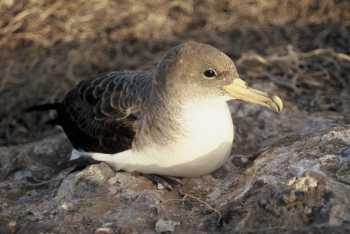Airam Rodríguez (Department of Evolutionary Ecology, Estación Biológica de Doñana Seville, Spain) and colleagues writing in the Marine Pollution Bulletin have looked at ingested plastic particles in fledgling Cory's Shearwaters Calonectris diomedea. Plastic pollution is a problem that has been shown to affect a number of shearwater species around the World.

Cory's Shearwater. Photograph by Paul Catry
The paper's abstract follows:
"Plastic ingestion by adult Procellariiformes has been widely recorded, but few studies have evaluated intergenerational transfer. We assessed the prevalence of plastic particles, as well as their basic characteristics, in the gut content of dead Cory's shearwater fledglings stranded by light pollution on Canary Islands. Eighty-three percent of birds were affected, containing on average 8.0 plastic pieces per bird. The average plastic weight per bird was low (2.97 ± 3.97 mg) compared with other petrel species. We found no relationships between plastic loads and body condition or body size, but negative effects may be hidden or delayed. We propose to use the fledglings stranded by light pollution to carry out more precise studies to understand the potential hidden costs of plastic ingestion; and to monitor in a long-term the marine debris to develop management actions for the control of pollution at the marine environment."
Reference:
Airam Rodríguez, A., Rodríguez, B, & Carrasco, M.N. 2012. High prevalence of parental delivery of plastic debris in Cory's shearwaters (Calonectris diomedea). Marine Pollution Bulletin dx.doi.org/10.1016/j.marpolbul.2012.06.011.
With thanks to John Kieser for information.
John Cooper, ACAP Information Officer, 18 July 2012

 Français
Français  English
English  Español
Español